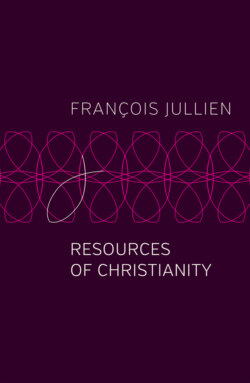Resources of Christianity

Реклама. ООО «ЛитРес», ИНН: 7719571260.
Оглавление
Francois Jullien. Resources of Christianity
CONTENTS
Guide
Pages
Resources of Christianity
Dedication
I Refusal to avoid (the question of Christianity)
Translator’s notes
II Resources
Translator’s notes
III An event is possible
Translator’s notes
IV What is it to be alive?
Translator’s notes
V The logic of de-coincidence
Translator’s notes
VI Reconfiguration of truth
Translator’s notes
VII Ex-istence: to dwell in the Other by abiding outside of the world
Translator’s notes
POLITY END USER LICENSE AGREEMENT
Отрывок из книги
François Jullien
Translated by Pedro Rodriguez
.....
At the same time, a philosophy of Christianity needn’t run counter to Spinozism, serving as its flipside, and give up the cause of reason. It needn’t illustrate Christianity by invoking the poetry or the bigger soul3 it has brought to the human experience (like Chateaubriand in The Genius of Christianity). The “soul” would never be content with an explanation, which will always come up short. It would cry out for “mystery”: “The most marvelous sentiments are those that stir a certain confusion in us.” This facile binary, in which the “vagueness” of the religious offsets the rigor of science, is suspect by its very convenience. The peal of evening bells in the countryside (or the Latin chants of the Church, or the paintings of Fra Angelico, etc.) might indeed convey emotion, but before drawing an argument from this we must declare what makes it religiously specific. The Christian religion, says Chateaubriand, has tended the “secret,” developed a “sense of the sacred,” but couldn’t we say the same of many other religions? And, in praising Christianity by comparison, we would fall, as Chateaubriand inevitably falls, into the trap of ethnocentrism. As we now know, the way of comparison with other religions leads nowhere. It rests entirely on ignorance of other cultures or, worse, on contempt for the Other, who serves only as the negative of his own affirmation. “The Romans,” says Chateaubriand, “were a horrible people.” This eulogy a contrario holds up only inasmuch as we enter into one coherence rather than the other – the comparison is justified only from within the extolled religion. Chateaubriand, partaking of the nascent Romanticism, did indeed begin to develop the concept of modernity. He also brought out the subjectivity that was effectively being promoted in Christianity. But what religion anywhere in the world lacks its own “genius”?
The inverse path, doubling back to Spinozism, albeit from a different angle, is the path of demystification. Here, rather than extoll Christianity, we must denounce Christianity’s “mystery.” We must reveal its illusion, and to do that we must reduce it to its “essence” (Feuerbach’s The Essence of Christianity). Spilling over the “national” framework and ethnic limits of the God of Israel, the nature of Christianity, says Feuerbach, has been to raise human aspiration, perceived in its universality, to the heights of the absolute. In other words, Feuerbach established the primacy of the subjective (sentiment: das Gemüt) over objectivity (as determined by science), to the point of reducing the one to the other. In still other words, he took the satisfaction of subjective (affective) needs and objectified them in God. This betokens the triumph of “love” over the “law” – whether nature’s or society’s. God is he who “says yes” to my wishes, impossible as they might be. This is why in Feuerbach’s eyes Christian faith amounts to belief in miracles. God can grant my aspiration, even if it contravenes the necessity of nature (death). In Christianity desire is elevated [exhaussé], as well as fulfilled [exaucé], until it transmutes into the most intimate certainty – becoming unconditional – of awareness [conscience]. Even if the fulfillment contradicts our understanding, or the facts of experience, and brings us up against the “unthinkable” (undenkbar). The fulfillment occurs instantly, meeting with no resistance from the world and requiring no patient effort of knowledge, for a miracle is “as rapid as a wish is impatient,”4 but what could it be if not a fiction where we mistake our desires for reality? What could it be if not the production and projection of an imagination that dreams as it likes of happiness, and never works towards it?
.....